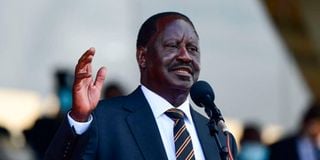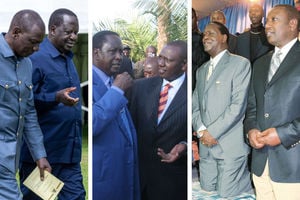
Orange Democratic Movement leader Raila Odinga.
The Raila Odinga-led ODM party has resolved to incorporate two critical organs into its party constitution, a move seen as an attempt by the opposition chief to protect his party from possible ‘perversion,’ as he sets his sights on the chairmanship of the African Union Commission (AUC).
The party’s National Executive Committee (NEC) meeting chaired by Mr Odinga in Nairobi last Thursday resolved to entrench the Board of Trustees and Council of Elders into its constitution in a bid to ring fence it from ‘mismanagement’ that could lead to its extinction.
The NEC at the same time endorsed the new-look three-member National Elections Coordinating Committee (NECC) to replace the defunct National Elections Board (NEB) that was disbanded.
“The NECC will have devolved roles, which will be executed at the county level by a three-member County Elections Committee,” ODM Deputy Secretary General Agnes Zani who read the resolutions said.
Sources at the NEC meeting intimated to Nation that whereas there have been three trustees of the party, two additional names were proposed and a decision made to have it formally included as a party organ into its constitution alongside the Council of Elders.
“These bodies are being given a permanent and significant role within the organizational framework of the party. They will have specific powers and responsibilities that are now constitutionally recognized, ensuring their influence and authority in the management of the party affairs,” a senior party official and NEC member revealed.
The five-member Board of Trustees in the party include Mr Odinga’s elder brother, who is also the Siaya Senator Dr Oburu Oginga, ODM National Treasurer Timothy Bosire, former Attorney General and ex-Busia Senator Amos Wako, ODM Deputy Secretary General Agnes Zani and the party’s Director of Finance and Administration Mr Joshua Kawino.
Mr Wako’s and Ms Zani’s names were proposed and approved during the NEC meeting last Thursday to join Dr Oginga, Mr Bosire and Mr Kawino in the five-member team that will now have critical management roles once members endorse the proposal and it’s incorporated in the party constitution and organizational structure.
The board of trustees typically includes key individuals involved with the management of an organization.
A board of trustees is similar to a board of directors and may act as such in some organizations.
ODM has yet to propose names for the membership of the Council of Elders, but the name of the founding party Secretary General and Kisumu Governor, Prof Anyang' Nyong'o, has been floated.
The party seeks to borrow from the German setup where the Council of Elders comprises the President of the German Bundestag, the Vice-Presidents and other members.
They may not be oldest but those who possess great experience of political life.
The Council of Elders assists the President of the German Bundestag in his or her work, helping to ensure that the business of the Bundestag is coordinated effectively and conducted as smoothly as possible.
The Council of Elders is a forum where disputes that have arisen are discussed and mediated.
There has been clamour for succession of Mr Odinga as the ODM leader after he hinted at his possible exit should he win the AUC post in February next year’s poll.
He has pointed out that he was still in the process of campaigning for the AUC post which he noted he could either win or not.
“In the unlikely event that I’m not elected, I will just be back but should I win, my deputies Hassan Joho and Wycliffe Oparanya are here and able to steer this party to success,” Mr Odinga told party delegates in Wajir last month.
The move however, stirred fierce succession contest in the party with Director of Political Affairs Opiyo Wandayi, ODM Secretary General Edwin Sifuna and Embakasi East MP Babu Owino also being linked to the battles.
On Saturday, Mumias West MP Johnson Naicca said should Mr Odinga win the AUC post, Mr Wandayi deserves to lead the orange outfit “due to his loyalty and consistency in the party”.
“Wandayi is the only reliable person and more qualified to step into Mr Odinga’s shoes in as far as running of this party is concerned,” Mr Naicca said at a funeral in his constituency.
Mathare MP Anthony Oluoch said that as Mr Odinga plans to exit to the African Union, “ODM is the only property we are left with and we must safeguard it.”
“That’s why we cannot allow ODM party to be auctioned. There are people we know had already defected and that’s their right. Some had already secured other parties but when they heard that Baba was going to the AU, they made an about-turn and are now seeking to succeed Baba,” Mr Oluoch said.
He said ODM members will not allow the party to be auctioned to the highest bidder.
“To Wandayi, the position you hold in the National Assembly was not given to you by Baba in vain. He knows why he put you there and he will make sure the party is in good hands and must remain steadfast,” added Mr Oluoch.
With the new proposals to incorporate additional organs in the party’s constitution, Mr Odinga is said to be keenly setting up protective barriers around the party’s governance to prevent practices or decisions that could be detrimental to its survival and effectiveness should he exit.
This strategy indicates a focus on long-term stability and preventing internal strife or mismanagement that could threaten the party’s existence.
“This is a strategic strengthening of the party's governance structures, aimed at ensuring its durability and integrity, particularly at a time when the party leader is eyeing a significant political role beyond national politics,” another party official told Nation.
This move seems designed to maintain control and stability within the party as Mr Odinga prepares for his ambitions within the African Union Commission.
During the NEC meeting last Thursday, Mr Odinga emphasized the need to ensure continuity of the party, saying parties are people-driven and not individualistic.
Mr Odinga reportedly recalled how Ford Kenya party which was the strongest opposition party at the advent of multipartyism in the 90s had been weakened due to individual interests.
“You can also see how Kanu which ruled the country for nearly 40 years and PNU which former President Mwai Kibaki used as his re-election vehicle in 2007 as well as former ruling party Jubilee are all struggling to have a bearing in the country’s politics.
“We agreed that we cannot let ODM crumble and we shall surely protect it,” an ODM NEC member disclosed.
Mr Odinga had early this month read the riot act to the top leadership of the party over succession bickering, warning that he will not allow the outfit to be balkanized.
While chairing the party’s Central Management Committee at his Capitol Hill office in Nairobi, he warned against divisions based on regions, religion and ethnicity, even as the outfit outlined a roadmap for its grassroots elections.
Sources at the meeting divulged to Nation that the ODM leader was firm, and threatened to publicly rebuke leaders who lead in advancing party elections along regions, religion and ethnicity lines.
“The meeting was cordial though the party leader remained firm for the entire period and cautioned top leadership against rallying their supporters along the three lines.”
“He went ahead to state that he would publicly disown leaders who advance such divisions ahead of the party’s elections and this will obviously come with serious political consequences,” a member of the committee told Nation after the meeting.
There has been tension in the party with factions coalescing around Mr Odinga’s two deputies – Hassan Joho and Wycliffe Oparanya forming, after the ODM leader hinted at his possible exit should he win the AUC post.
A section of leaders from the Coast, Western and Nyanza had even stepped up the campaigns to succeed Mr Odinga while backing Mr Joho, Mr Oparanya and Mr Wandayi respectively, to take the mantle.
The coming grassroots elections, would provide the best opportunity for them to plant their allies ahead of the national elections.
“We have noted immense interest in the party. We are particularly encouraged by the number of young men and women who have expressed interest in vying for leadership. It is the greatest assurance that the party has a future and is still seen as a viable tool for national leadership,” said Mr Sifuna.
ODM, he said, had resolved to have its members pursue their ambitions with a “sense of responsibility to strengthen not weaken our unity and solidarity and to focus all our attention and energy on that big and main task for any political party, which is to take power.”
“We therefore agreed not to allow election activities to be the source of divisions or cause cracks in ODM. The elections must be seen as a friendly match and not a do-or-die,” he said.
The party has staggered its grassroots elections beginning April 27 with the first cohort polls in Kwale, Busia and Siaya Counties.
On April 29, the party shall hold its elections in Kajiado, Migori and Wajir, while on April 30 the elections will be conducted in Kisii, Vihiga and Murang’a counties.









